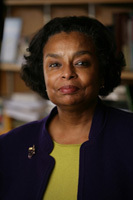
Some may assume that President Barack Obama, as the nation’s first black chief executive, bears the responsibility for shaping an agenda for minority interests, but this top-down approach is the precise inverse of the community organizing approach that helped get him elected, according to an article in this month’s edition of Focus Magazine by Dianne Pinderhughes, professor of political science at the University of Notre Dame.
“I would argue that this same approach, carried forward by an ongoing coalition of civil rights, racial and ethnic interest organizations and policy think tanks, is vital to designing, articulating and advancing the policies and strategies that will effectuate the change that President Obama’s election represents to so many people,” she wrote in “Barack Obama: The First Black President — Hope at Last for America?”
The article goes on to say that a key challenge for the Obama administration will be to focus on the fact that current national crises, especially the economic downturn, affect the African-American community — whose income, unemployment and wealth compares poorly with whites — with more intensity than they do the population as a whole.
Pinderhughes calls on organizations representing African-American, Latino and other minorities to shape both a policy agenda and the political strategy to incorporate their distinctive political interests into the administration’s policies.
“Examples that should be high on the racial/ethnic politics agenda include the protection of voting rights and more extensive attention to the economic status of African-Americans,” she said. “Our current period of economic instability, which gave rise to the American electorate’s readiness for change and its willingness to elect a black president, has also created an opportunity for the nation to begin to construct a more inclusive social policy agenda.”
The former president of the American Political Science Association, Pinderhughes studies inequality with a focus on racial and ethnic politics and public policy. She is the author of “Race and Ethnicity in Chicago Politics: A Reexamination of Pluralist Theory,” as well as numerous articles, including several for the National Urban League’s “State of Black America” and book chapters addressing issues of race, public policy, and electoral politics. She also is a member of the Board of Governors of the Joint Center for Political and Economic Studies.
Contact: Dianne Pinderhughes, 574-631-3676, pinderhughes.1@nd.edu